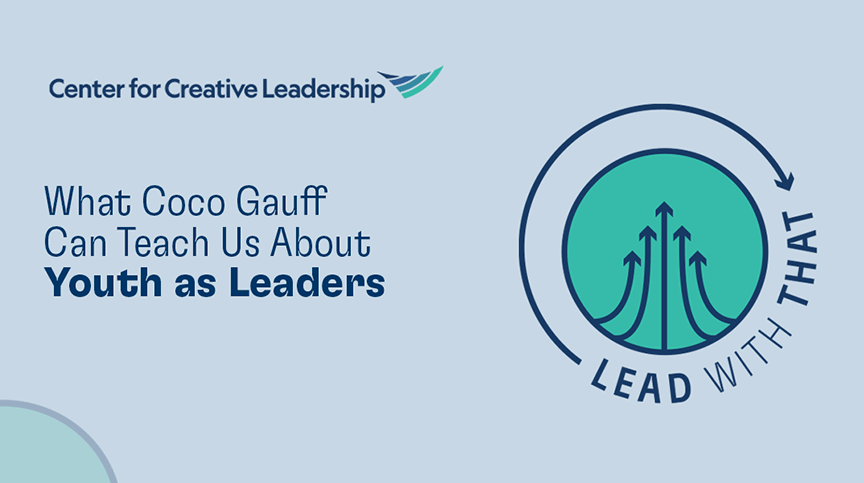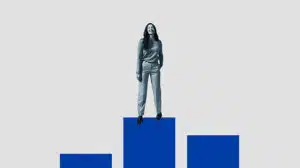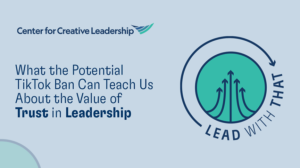- PODCAST
Lead With That: What Coco Gauff Can Teach Us About Youth as Leaders

In this episode of Lead With That, Ren and Allison discuss tennis superstar Coco Gauff and how, at only 19 years old, she has shown tremendous leadership potential through her work on and off the court. From her display of unparalleled athleticism and mental fortitude during matches, to being a strong advocate for social justice initiatives and advancing her community, she has become a role model for many young people around the world. Listen as Ren and Allison picture what their careers would be like if Coco was their manager.
This is the first episode in our special Lead With That series, “Manager Madness,” where we discuss public figures, real or fictional, who embody leadership through both their actions and ability to inspire others. Our listeners voted in a “Manager Madness” bracket on social media to rank the leaders they would most want to work with. In the coming months, Ren and Allison will be chatting about each of them until we reveal the winner.
Listen to the Podcast
In this episode of Lead With That, Ren and Allison discuss tennis sensation Coco Gauff. From her talents and maturity on the court, to her dedication to advocacy initiatives in her community, Gauff has become a beacon of inspiration for many young people around the world. Allison and Ren explore the possibilities of what it would be like to work with her as a manager, and lead with that.
Interview Transcript
INTRO:
Welcome back to CCL’s podcast, Lead With That. We talk current events and pop culture to look at where leadership is happening and what’s happening with leadership. It’s manager madness, Allison. That’s right. Where we, one by one, discuss public figures, real or fictional, randomly pitted against one another to see who comes out on top.
Ren:
Today, Coco Gauff. Now Cori Gauff, or Coco, is an American professional tennis player who burst onto the international scene at 15 years old. Then, in a stunning upset, Coco defeated her idol, Venus Williams, in the first round at Wimbledon, making her the first young player, or rather the youngest player since 1991, to win a main draw match at Wimbledon.
While she didn’t win that tournament, that was just the beginning. At 19, Coco was already a US Open veteran, but during her fifth trip, she won that Grand Slam title.
She’s won a singles title in the World Tennis Association. She’s also achieved doubles success, winning 2 Grand Slam titles in mixed doubles.
Known for her aggressive baseline play, athleticism, and mental strength, Gauff has been hailed as one of the brightest young tennis players around and is the future for American tennis.
Off the court too, Gauff is an advocate for social justice and has often used her platform to speak out against racial inequality, police brutality. She’s vocal about her support for [the] Black Lives Matter movement. And Gauff’s maturity, both as an athlete and an activist, has made her a young role model for many aspiring people around the world.
So, welcome back everyone, or for the first time, if this is the first time you’re coming. My name is Ren Washington, and as usual, I’m joined with Allison Barr.
Allison, in a word or 2, if Coco was your boss, what would you be excited about, and what would you be worried about?
Allison:
In a word or 2, I would be excited about her composure under incredible amounts of pressure. She’s very composed, and there are a few other things. I’ll pause until we get into those. So, that would be the first thing I would be excited about. I cannot think of anything that I would be worried about. What about you?
Ren:
You wouldn’t be worried about anything. She’s so perfect. You wouldn’t be worried about —
Allison:
I didn’t say she was perfect, but —
Ren:
You just can’t think of something that would be.
Allison:
Well, my boss is also not perfect, but I don’t worry. I’m not worried.
Ren:
Ah. So, we’re already getting into it, everyone. So, wait. Hold on. Is this because of your personality, you just don’t get worried, therefore, worry does not exist in your lexicon?
Allison:
No, no. Let it be known that I actually score as a worrier.
Ren:
Oh, you do?
Allison:
Oh, yes. I don’t worry about other people’s behavior, necessarily. It’s more my own.
Ren:
Okay. Interesting. So, what do you think that she might do that would worry you about your own behavior?
Allison:
Oh, my gosh.
Ren:
… treat you like a hostile witness, over here.
Allison:
Welcome to therapy with Ren and Allison.
Ren:
Yeah.
Allison:
Ask me that question again. What do I think she would –
Ren:
Well, I’m just really trying to prime you.
Allison:
Okay, okay.
Ren:
If you had to say it, if you had to tell me, one thing that could possibly worry you. Something that she did that would make you worry about your own self. What would that be?
Allison:
I would worry if I could meet the expectations.
Ren:
Ah. That you put on yourself about being around such greatness.
Allison:
Yes. Like, “Could I possibly meet the standards she sets for herself?” I don’t know. Would she set those for her team? I have no idea … We could get into a rabbit hole here, but I would like you to also answer the same questions that you asked me.
Ren:
Well, you’ll get your wish. But, thank you. I think that’s a very valid and useful question when we ask leaders, sometimes, “What would worry you about that person?” Yeah. I’d be worried that I couldn’t live up to the expectation that they set for themselves. I often caution leaders about not using your own expectations for others. So, yes. There is something there.
Let’s see. What would I be excited about? Gosh, seeing the world through the eyes of a young success. So maybe, young success are my 2 words. What would I be worried about? Young success. That’s also the thing that might make me most cautious.
Allison:
Say more about that.
Ren:
I think this might come up more later when we talk about, “Would we want to work for this person, or would we want this person as our leader?” Like strengths overplayed, potential shadow sides …
A lot of times if you have experience, or experience success early, sometimes the biggest killer for success is a failure to adapt from what gave you success. So, reasonably, I could look at someone who’s had to deal with older people telling her what to do her whole life. She could look back and say, “What the hell do you know? I’m a pro. I’m one of the best in the world, and I’m 19.”
Allison:
Yeah.
Ren:
That person may very well be clouded by, rightfully so, their perfection, their own expectations, and maybe not give me space, or themselves, space to grow.
Allison:
Interesting. When she won the US Open last year, she beat the number 1 seed, Sabalenka, at age 19. She’ll be 20 in March, I believe. So, she’s 19 years old.
What makes me curious about what you said, is her response after she won — was immense gratitude, not only for her own team and her parents of course, and those who support her directly, but for people who indirectly support her. That’s sort of what also got me excited to talk about her, too. She just won one of the biggest tennis tournaments in the world.
Ren:
Yeah.
Allison:
Again, at age 19 years old. How would you have responded, do you think, at age 19? If you think about Ren, as Ren was at age 19. For your own sport, winning the biggest tournament in the world, in your own country where people are rooting you on, wholeheartedly. You’re asked to talk about that. What do you think?
Ren:
Yeah.
Allison:
19-year-old Ren, how would that go?
Ren:
Did you see Travis Kelce —
Allison:
Yes.
Ren:
— after the Super Bowl, in his speech when he was —
Allison:
Yes.
Ren:
— on stage?
Allison:
Yes. I —
Ren:
Like that, but worse. A much, much worse version.
Allison:
Wait. How worse? I need to know worse.
Ren:
I don’t know. I mean, are you asking me, “Ren, do you think you have the composure that Coco Gauff does?” I don’t know if I have the composure, still, that Coco Gauff does.
Now, it does remind me of the good people she must surround herself with. So, I guess you’re saying that, maybe, my fears of her youth are misplaced?
Allison:
Well, just curious. Right? I’m sure she gets media training because they all do, I’m sure. But somebody like Ben Shelton, if you don’t know who that is, Google him.
Ren:
I don’t.
Allison:
I think he’s, maybe, around the same age, and I think he’s got the fastest serve on the men’s side. He’s up and coming. He hasn’t won any Grand Slams, yet. Anyhow, regardless. Different person. But his response is, one might say, a little bit overconfident in comparison, for somebody who has never won a Slam. Right?
Where Coco Gauff, in her press conferences, was thanking the camera crew, the ball kids, the tournament director, all of the people who put the tournament together. I’ll quote her because this is her language, not mine. She thanked her “haters for driving her.” My point is that she took the time to think about all of the people that come together to make the tournament happen in the first place. Without any of them, she knows that her success, it just wouldn’t have happened.
Ren:
So to juxtapose, who’s this Ben guy? What’s his name?
Allison:
Ben Shelton. I’m sorry, Ben.
Ren:
Ben Shelton.
Allison:
Yeah. I like you, Ben.
Ren:
You’re getting flamed, Ben. No. It’s okay. So, he’s a little cocky. So maybe in the true spirit of SBI — Situation, Behavior, Impact — what indicates to you his cockiness or arrogance? Because I think we heard something that is meaningful for you for Coco, which is maybe the demonstrated humility by talking about how grateful she is and how thankful she is. I didn’t see Ben. I think he got to the semis this year. Right? Or something like that. I don’t even know how well he performed.
Allison:
Yeah. Quarters or semis. So, I also want to acknowledge that I know there’s part of sports psychology where you have to hype yourself up. I get that. I understand that.
Ren:
Sure.
Allison:
Especially, when you’re an individual playing against another individual. You don’t have a team to hype you up. I know there’s part of psychology around this. Again, he has one of the biggest serves in tennis, ever. It’s ridiculous. If you haven’t seen it, you should look. I think his speeds are up to 140 miles an hour, or more than that. It’s unbelievable.
Ren:
That’s fun. That’s dangerous. It’s scary.
Allison:
Yeah. So his celebration, I’m going to try to describe it, but I can show you, Ren, as we’re here. Any time he would do something well, he would act like he was answering the phone, put his hand up to his ear. Then, slam it as if he was just … Which I don’t really understand what that means, anyhow. That was his little celebratory, “In your face, Ren. I just aced you for the 10th time in a row.”
Ren:
Okay. Yeah.
Allison:
Whatever that is. He got absolutely annihilated by Novak Djokovic, who’s the number 1 seed of course, and did that a couple times in that match. I’m like, “Is this really … You know? You’re kind of getting schooled here. Is this time for you to be hanging up your banana phone,” or whatever?
Ren:
That’s funny. I just watched it. I think he’s probably like, “Who? I can’t hear you anymore.” He’s hanging up on his haters, too.
Allison:
Oh.
Ren:
It’s probably —
Allison:
Is that what that means? Okay.
Ren:
I have no idea. That’s just my quick assessment. But, you’re saying it’s not like grace under fire or generosity. Then, the worst is when someone’s braggadocious, and then they get crushed by the best tennis player around.
Allison:
Right.
Ren:
You’re like, “Well, there you go, kid.”
Allison:
To which Djokovic, rightfully, did right back at him after he won. Which, you know? The little tension on the sports, I’m here for it.
Ren:
Yeah.
Allison:
But my point is, then you listen to that press conference versus a press conference by somebody who just won the whole tournament at age 19 —
Ren:
Yeah.
Allison:
— won the whole thing, the entire thing, who was expressing so much gratitude to the people who helped her to get there.
Ren:
Yeah.
Allison:
So, my SBI to her, then, is when you expressed gratitude towards literally everybody she could possibly think of in her life, directly or indirectly, I felt inspired by that.
Ren:
Same. Yeah. Admittedly, I mean, we’re going to be talking about the most elite, most amazing people on the planet.
Allison:
Yes.
Ren:
So obviously, she’s incredibly special. You don’t have that kind of success at being that special. So, any nitpicking I might do is just in service of that. But, I do wonder. Maybe, this is part of this question around would I want this person as my leader, is the exploration of even the most advanced youth?
Let’s take Coco now. Coco at 29, would she look backward and be … I can only imagine that Coco is going to be more mature, more advanced than she is now, in 10 years, simply because she’s demonstrated her willingness to work on herself so much today. So maybe, that’s the paradigm that I’m tapping at. Well, let me ask you a question. Would you want to have Coco be your leader, knowing that you’d be worried about living up to her expectations?
Allison:
Yes. Because I appreciate when people push the limits of what I think I’m capable of.
Ren:
Could she even conceptualize it at 19?
Allison:
Conceptualize what?
Ren:
The limits of your capabilities.
Allison:
What’s driving that question?
Ren:
I mean, just biochemically, her brain literally isn’t finished forming, yet. So, some of the connections that she might need to ethereally think big enough about your capabilities, she may not even have the language to do so. When we talk capabilities, could she think that you’d crush that Excel spreadsheet? Or, would she think like me, the capabilities, Allison, that you might have on changing the world, 3 legacies down, by someone you had a conversation with in a program? Would she even be able to conceptualize that as a start point for capability development?
Allison:
Well, you raise an interesting question. So, a couple of things. The first thing that comes to mind is that she is ranked, with her partner, number 1 in doubles. They’re ranked number 1. That is in the world, by the way. And so —
Ren:
Is it mixed doubles, too, or —
Allison:
Ooh. Oh, that’s a good question actually —
Ren:
Because she’s got a mixed doubles title. That’s important, listeners, because the mix is the men and women playing together. Just again, talks about her general prowess, I would say. But —
Allison:
Mm-hmm. Yeah.
Ren:
Sorry. Go ahead.
Allison:
That’s okay. Any time you’re working in a partnership with somebody to achieve a goal, regardless if it’s tennis or a podcast or something else, building a house, whatever, to work effectively with somebody else, it’s helpful to be able to acknowledge what their strengths are, give some encouragement when needed, push a little when necessary. I would be hard-pressed to believe that they don’t do that with each other.
So, yes. I think she would be capable. Now, let’s be real. She’s a tennis expert. You and I work in leadership development. So, am I to assume that she’s an expert in leadership development for the sake of this conversation?
Ren:
Well, you raise an interesting point because are we going to be direct, or not? I think we can do both. We often have clients who have to work for someone who’s out of industry. We often hear about that. Right? Organizations will hire us and they’ll be like, “Yo.” Everyone’s homegrown. We’re hiring someone new. They don’t work in the industry, they’re brand new. We have to teach people or help them understand how to overcome their reticence to engage them. We got to teach this other person to embed themselves in a way that matters. So, I don’t know. Whatever’s useful for your conversation, maybe both. Maybe, she doesn’t and she does.
Allison:
Well, her age doesn’t concern me because I’ve met 65-year-old leaders who cannot do it either. So to answer that question directly, given her career thus far, her age does not concern me.
Ren:
I’m not concerned by her age. I’m not —
Allison:
You directly mentioned her age.
Ren:
Because I’m corresponding her biological age to her physical development of her brain. Now, you and I get to debate psychologically or philosophically whether a fully developed brain leads to fully developed thoughts or fully developed humanity. Now, chuckle, ha, ha. Fully developed humanity, does that take 65 years or hundreds of years and many circles around the sun? These are the things that I’m ultimately exploring. Do I think 29-year-old Coco Gauff would be better than 19-year-old Coco Gauff at leading me, or leadership? I might bet on it.
Allison:
Yeah. You might be right. You might be wrong. You might be right. There’s no way I would turn down that opportunity.
Ren:
Just to work for her, or with her.
Allison:
Yes. Correct. To bring up another example. I don’t know how much you watch tennis, Ren, or our listeners. There are some tennis players who are very famous and well-known, who make spectacles when they’re in frustration on the tennis court. I mean, swearing at the umpire, in really hostile ways.
Ren:
Yeah.
Allison:
Crushing their rackets, throwing adult temper tantrums. This is somebody who played a match at the US Open. I can’t remember if it was the quarterfinals. It was prior to the semis. Played a German woman who constantly violated the rules. I don’t know if you read about this, Ren. The umpire was not calling any sort of violation for her opponent for violating the rules, time and time and time again. And, Coco Gauff’s response to that was what you would want it to be when there’s a little bit of volatility at the workplace. Right? Calm under pressure, facts. Factually, this is what has happened. She calmly walked over to the umpire. “This is what’s happening. I know that you know it, and I know that you see it.” I don’t know what exactly she said, but stated her expectation pretty clearly. After she did that, everything changed.
I could probably name, top of mind, at least 5 tennis players who have thrown temper tantrums, like major temper tantrums. We know that happens at the workplace. I don’t want to work for a leader who throws a temper tantrum. Do you?
Ren:
No. No, thank you. I don’t want to work with a person who throws a temper tantrum.
Allison:
Right. And I mean, part of that probably has to do, again, with the team that’s around her. I think she’s acknowledged that, as well. But, you were just going to say something.
Ren:
Well, you raise an interesting point. So, it’s like I tell my kids around driving. Tell them all these rules and these standards of behavior, and they’ll look at us and they’ll be like, “Ugh. Don’t you trust me?” And, “Bluh. Don’t you believe in me?” We’re, “Yeah. I believe in you. But, it’s like you said. I don’t believe in that other 65-year-old idiot, who’s been driving poorly their whole life, who doesn’t know what they’re doing. They’re the person I have to look out for. So, I’m teaching you to be cautious of them.”
So then, I wonder. Fine, let’s say Coco’s got the most steely nerves and she, despite her years, has withstood enough to control her reactions enough, which I still don’t think is true, but let’s say she is. Does she have the wherewithal to manage someone else’s reactions? I think you know, in a workspace, people react, and then they start to say really trite and personal and mean things, just because they’re in a fight-or-flight state.
So, do you have any caution about her ability to keep her cool when, maybe, it’s someone else giving her direct duress? I guess the situation you said is sort of like that, but I don’t know. What’s your reaction?
Allison:
I’m pausing and processing your question. So, I want to make sure I understand. The question is, let’s say you and I were really going at it.
Ren:
Right.
Allison:
She manages both of us, and she has to take care of that. Is that what you’re saying? She’s got to step in?
Ren:
Or even that we’re going at it. Then, she comes in, and it spills over onto her. I think, maybe, it’s like an EQ question. Think about yourself just now, as an adult. In emotional intelligence one of the key principles is self-awareness, self-exploration so you can be informed about how your emotions impact your relationships with others. That’s, like, a lifelong journey. You know what I mean? There’s so much I’m learning about myself today, and I am … 10 years older than Coco. I am … What would that mean? 29? Sure. Let’s go with it people.
Allison:
Yeah.
Ren:
Yeah. So, I’m still learning, as a spry 29-year-old, about my emotions. I think that’s what I’m talking about. She has to manage us, and then she has to manage spillage onto her.
Allison:
Well, given that I’m 25, and just turned 25 a few weeks ago … We’re just going to go with that. There are some “youngins”over here.
Ren:
I like it.
Allison:
So I think I would assume she has to navigate that. I can picture images of her mom, for example, in the stands, just ripping her fingernails off. You know?
Ren:
Yeah.
Allison:
Watching her daughter play and the anxiety that her parents probably feel watching her play. I also can think about watching a match of hers. Gosh, I don’t know what year this was it. Maybe, it was 2019, maybe. I’m not sure. She played Osaka, who I think we’ve talked about here on the podcast. She played Osaka and lost maybe in the semi-finals or the finals. I can’t remember. But, she was very upset and was teary-eyed and took the moment to have a bit of a camaraderie with Osaka. Some of that was guided by Osaka, at the end of the match where the winner generally gets interviewed, Naomi Osaka said, “Let’s do it together. This crowd is here to support you, too.”
I love tennis, so I do follow it. After that match, I saw a major shift in how she behaved on the court when she lost.
So, my whole point is that she seems to be a quick study and a quick learner and understands that that mental and emotional regulation is crucial for success, crucial. I do think she’d be able to do that.
Ren:
Yeah. Maybe, it’s just my personal concern that the world is so bitter and the weight of all of that. The perspective of thanking my haters. Even the strongest wall is susceptible to some erosion, and without constant and steady reapplication and attention to those edges that may erode … those critics and the inner critic that I know she’s got to manage, everyone does, but she’s got to manage that. Her level of expectation is so high, I’ve got to imagine that the critic is high. Then also, the other voices. I wonder, would she lose sight of herself? I think you’re right. She’s got this learning agility, this ability to move quickly, to learn from her losses, to change her posture. She doesn’t seem immune to changing her behavior, but there’s time, yet, man. There are traumas yet to happen that would make her stay and divert to going off the rails. So then, I wonder how can she continue to strengthen the skills that get her here and add new skills that will get her there?
Allison:
Well, given that she already has, and so quickly, that’s what gives me a little bit more hope. But, a question for you. If I were to describe you only as somebody who I work with, I mean, I guess you are who you are at work, but if I were to describe your working style to somebody, some of the things I might say is that you are very thoughtful, that you are very savvy, that you are methodical when needed, and you understand your audience. I’ll knock on wood for us, here, because I’ve never seen you, what I would call emotionally dysregulated, at the workplace. I can guarantee you, because you’re human, you’ve probably felt that as things probably get under your skin.
Ren:
Yeah.
Allison:
So maybe, then, you go home and do whatever it is you need to do to process that. My point is everybody becomes frustrated. Everybody does. It’s what your habits are to then process it in a way that’s, dare I say, professional. I don’t love that word. Professional is the best thing I can come up with. That’s sort of what I see from her.
My bigger question to you is, then, how are you able to do that? Do you agree with what I’m saying? How are you able to remain composed at the workplace when things frustrate you, or rattle you?
Ren:
Well, this maybe goes to my concern. How am I able to? I don’t know. Decades of self-work?
Allison:
Okay.
Ren:
I mean, for real. And, that might be a light joke. I mean, I don’t think that it’s impossible for someone younger to attain it. Actually, maybe that’s what you’re saying, and we can see it better in her. She’s clearly more advanced than I was at 19. By whatever circumstance, whatever hard work she did, she’s at a position, now, where she’s gotten much and afforded herself a chance to act with grace and presence of mind at 19. The same kind of presence of mind that I could feel proud of, I think you said, as an adult. I could look at it and say, “She responded the way you’d want someone to respond.” But, how do I do it? When I’m able to be successful, it is loads and loads of diligence.
I was just reading. I’m nearly done with Marcus Aurelius and his Meditations. Part of the Stoic philosophy is not judging other people because whatever people are, who they are, it just is. But, he was saying something like, “You have to have learned a lot to effectively judge someone.” His premise was, “Don’t judge anyone. But if you are going to judge someone, you have to have loads of experience.”
So maybe, I just keep coming back to this tension that, naturally, young people always have to face in the work world. You don’t know what you don’t know. I don’t think real world experience counts for Coco because she’s been playing at the heights of her profession for 4 years. So, she’s the best in the world. One of the best in the world. It doesn’t go, but I could look at her and be like, “You don’t even know.”
It’s like when a little kid looks at you, and they talk about their first love. You want to support that love. You’re like, “Damn it. I love you, too.”
Allison:
Yes.
Ren:
And you look at him like, “You don’t know what the hell you’re talking about, man.” Like, “Love is tough.” That’s what you want to tell that little kid. I don’t know. Is that making any sense?
Allison:
Yeah. It makes sense, and I would have to just challenge you a little bit. For her craft. Right? For her specific craft, she has experienced the most pressure that you could experience in her craft. It’s like being … I can’t even think of a comparison. If you were the CEO of CCL, or the owner of multiple firms, with a spotlight on you, constantly, to see when you were going to misstep, I would argue that she has experience, and it’s global. Tennis is a global sport and does not have an off season, even physically, which is a different story. I would say that my trust in her is high because she has demonstrated that she can handle that, time and time again.
She made it to the semis, maybe, or the quarters in the Australian Open after just winning the biggest tournament. I could, again, name some players who slam their rackets and throw tantrums. You know? Maybe, she does when she goes home, but she knows what’s appropriate, is why I would trust in her.
Ren:
Yeah. What I think I’m coming around to is … I didn’t make this clear earlier. But, yeah. I think from an experience standpoint, it wouldn’t be reasonable for anyone to look at her and be like, “What do you know?” Because she’s been playing at the upper reaches of her reach for a while. So, I think she’s got that. But maybe, what you’re saying, too, is more that she has also the experience of the pressure that a leader at the highest reaches of their game has experienced, for 4 years. Maybe, the most fragile point of her existence, as a 15-year-old forming into a young adult, she’s had to undergo this. So maybe, she has experienced the life lessons that I use to keep myself grounded. So maybe, that I’m seeing, those are the experiences that afford someone the wisdom that goes beyond their years.
Allison:
Yeah. Again, I think she has a solid team around her. So, if I were going to have Coco Gauff as my direct leader, I would keep my fingers crossed that her team would come with her because, again, she’s also very straightforward about that. It’s her team that makes her as successful as she is. I also appreciate a leader who says that, too.
Ren:
Says what? That my team is a big part of my success?
Allison:
Yes.
Ren:
Yeah. Well, maybe then, let’s start to shift to this conversation, as it relates to you, listening. We’re talking about Coco Gauff. Yeah. She’s awesome, but what does that have to do with me and my purchasing orders, or how do I manage supply chain?
So maybe, we can start to pivot to … Because I love that idea of the people around you really, really matter. Being brave enough to have good people around you is a muscle everyone needs to work out, regularly. So, is there anything else? Should we talk about Coco, about her character, her personhood, before we start talking about why this matters for leadership, or connections to leadership and leading?
Allison:
I think we’re getting there. The only other thing that came up is not direct about her, necessarily. Do you necessarily need to know how to do everything at an organization to be a leader at that organization, is something that’s coming up for me. To be an effective leader, do you have to know everything? Because she certainly doesn’t. That’s why she has a team.
Ren:
Right.
Allison:
So, that’s sort of where my head is starting to go.
Ren:
Yeah. Well, let’s answer that, and then, let’s go connect it to leaders. Because if you are a leader, listening, and you are going to a new place where you don’t, I think, no. My answer is you don’t need to. You need to know what they do. You probably need to know why they do it, more. You need to be willing to learn both of those things. So, I’d say that’s probably what someone needs to do. What do you think?
Allison:
Agree. I don’t think it hurts, I don’t think it hurts. I agree with everything you said. A mistake that I see organizations make, sometimes, is this person’s really good at their “individual contributor job.” I’m air quoting. “So, let’s promote them to a leader.” It doesn’t mean that they can’t be. Some of them are. I would recommend looking a little bit deeper under the hood before you promote somebody to a leadership role just because they’re good at their individual craft.
Ren:
Well, not to backpedal a little bit, but maybe point number 2 around my caution of Miss Gauff as being my leader. She achieved as an individual, the highest of reaches. That takes a certain kind of skillset and a certain kind of mindset. Now, is Coco going to kind of want to let me do it when she can clearly do it better than me? Now, maybe she doesn’t know the industry. But, yeah. I think that there’s probably something around that. I think there is sometimes a risk, too, of being too close to the industry. There’s some bad habits that we need to unlearn. I think what we’re saying, though, is that it’s not really a factor that restricts or advances, necessarily. It’s kind of what you do with it, your awareness of the industry.
Allison:
Yeah. I think so, I think so. And again, I’m going to repeat myself. Just re-grounding that she also plays doubles, maybe mixed, maybe 2 different variations. I’m not sure, but she’s number 1 in the world. There’s a team effort there that’s different from playing singles match. So, anyhow. I only say that to just highlight her experience is much more broad than simply playing singles, which is different.
Ren:
Well, naturally I want to poke the bear and say, well, a team of 2 is different from a team of 20, but the principles maybe withstand. That’s what we could talk about.
Allison:
It’s not though.
Ren:
No. It’s not. Okay. Great. Why?
Allison:
I don’t think it is.
Ren:
Yes. Tell me why.
Allison:
I realize the comparison I’m making is not apples to apples. McDonald’s, or a workplace, is not the same as playing tennis. I understand that’s different.
Ren:
Sure.
Allison:
However, you have 2 people playing 2 people. Right?
Ren:
Yeah.
Allison:
To reach an objective. Both teams, if you will, have their teams with them, who are part of that, and those teams have their people. So, there’s a structural element that’s similar and all of that needs to be aligned.
Ren:
Very good answer. Very good. I like it. That makes plenty of sense to me. I’m not here to just drag my feet. Okay. Sure, sure. Good job, Miss Barr. So maybe, then that’s some of what we can take away as you’re listening. I love the idea, and I say it all the time, “Aces in their places.” For me, personally, it’s like, “How can I work to be the dumbest person in the room?” Because I am not stupid. So, if I’m the dumbest person in the room, that’s a pretty badass room.
Allison:
Indeed.
Ren:
So, what other things is it that she does that matters for us, listening, versus things that we can connect to leadership, that matter?
Allison:
I don’t know if I’ve said directly. So, I’ll just say my top 3 that are helpful if you are a leader at an organization, or anywhere, is her ability to be composed under pressure, right now. I’ll be curious if you say the same, Ren. Most, if not all, of my clients are feeling worlds of pressure right now, and volatility and uncertainty. Lot of battles happening either internally or external to the company, or both. That ability to stay composed under pressure will lead you to your solution a lot faster. We know this, we talk about this. So, her composure under pressure would be the first thing.
Her gratitude and/or her ability to acknowledge her team and the people who supported her to get there, all the way out to people who sell the popcorn at the stadiums, making it an environment where people want to be. She’s aware of that entire ecosystem that helps her to get to where she is. And I think I would say strategy. I mean, you have to be strategic to be the kind of professional that she is.
Ren:
Yeah. What is she strategizing about, do you think?
Allison:
Oh, I think in every single moment that she plays a match, she’s strategizing in every moment on the spot.
Ren:
And like you’re … people are looking at you.
Allison:
And, likely.
Ren:
Yeah.
Allison:
Well, no, no. I mean if you and I are playing a tennis match.
Ren:
Just the game. Yeah.
Allison:
Yeah. I got to be pretty on top of my strategy for you. I think if she loses a match, looking back and saying, “Okay. What do I need to do differently?” Or, if she wins a match, “What can I keep?” Right? I think her entire career is probably based on strategy.
Ren:
Then maybe, that’s where I’ll pick it up because we were talking so big picture. The strategy it takes to weave together the doubles team and then their outfits, and then their outfits right? All those people in support networks and making all of that work. It’s having that 30,000-foot view of all of the resources at your fingertips. I think the thing that’s going to serve Coco the best, as if she needs my help, it is just her willingness to continue to learn from her experiences. I can only hope that she continues to have people around her who are ready for a fall. No one ever experiences a perfect run the whole time, whatever that means. Maybe, she never loses in tennis or experiences dips. Whether it’s that big first emotional dip, or a big loss, or a realization that maybe her future’s not in tennis, whatever that thing is for her, that’s coming for her because she’s 19 years old.
Now again, I’m not beating the idea of that, but she’s still a child. There’s just so much life yet to happen for her. I hope that what it does, she can stand strong as she has her whole life and in her youth, with her heart open, now. Yeah. It’s like, “Navigate that real experience with a real heart.” You said it, her heart, people feel it outside the stadium in concessions.
Allison:
Mm-hmm.
Ren:
So, I just think that sticks out, for me, for her, about something, and I hope she can maintain.
Allison:
Well, I mean, she’s probably listening. Let’s be honest. Let’s be real.
Ren:
Yeah. You’re welcome, Coco.
Allison:
Our podcast is probably priority to her. So, Coco, hire me. I have no reservations about you leading me.
Ren:
I love it.
Allison:
So maybe, that’s a good place to pause, landing on some of those key qualities that you and I just mentioned as a leader. Really investigating the things that you and I just talked about, and how they can serve you at your own organization. Namely, what Ren just mentioned about her ability to do some reflection and look at what’s working and what’s not, which can be one of the greatest, greatest talents or skills as a leader. So, Ren, any last words before we move on?
Ren:
Hot dog.
Allison:
Okay. All right. We’ll leave you with that, listeners. As always, Ren, thanks for the conversation.
Ren:
Yeah, thanks.
Allison:
And a big thank you to our podcast team who works behind the scenes to get us off the ground.
As always, you can find all of our podcasts and show notes on ccl.org. Tune in next time to talk about the next leader, which I will keep secret, for now.
Ren:
That’s right.
Allison:
And we look forward to tuning in next time. Thanks everyone.
Ren:
Thanks, Allison. Thanks, everybody.
Find Allison on TikTok.
| Related Solutions
Sign Up for Newsletters
Don’t miss a single insight! Get our latest cutting-edge, research-based leadership content sent directly to your inbox.








